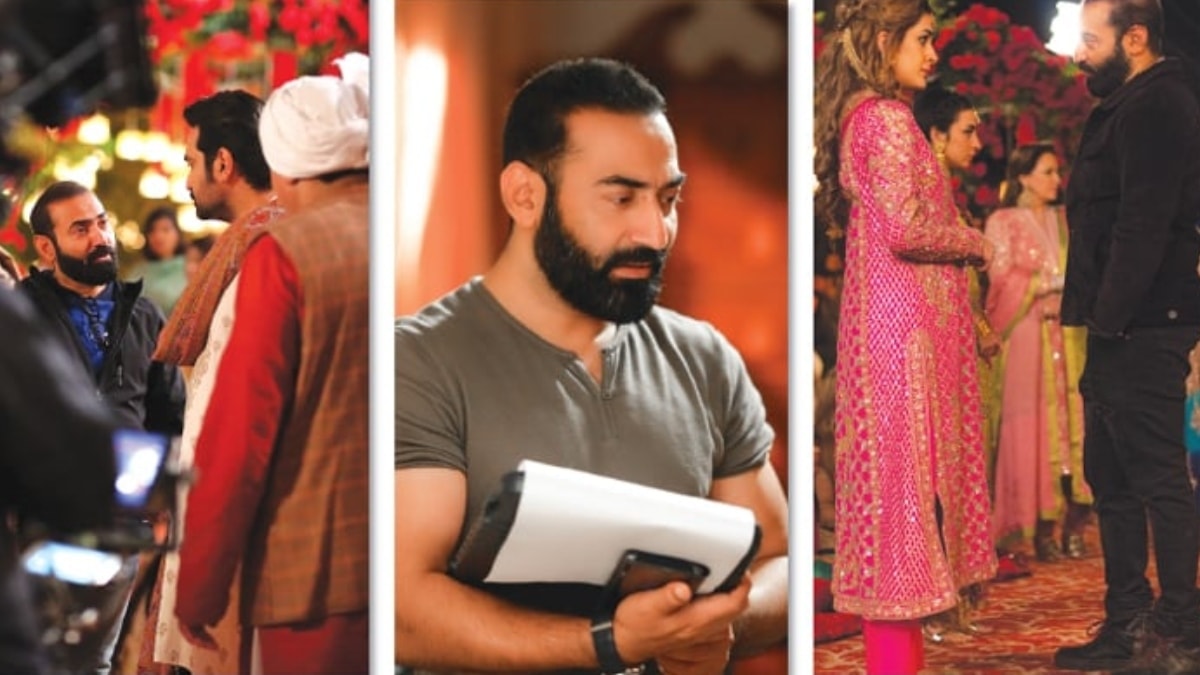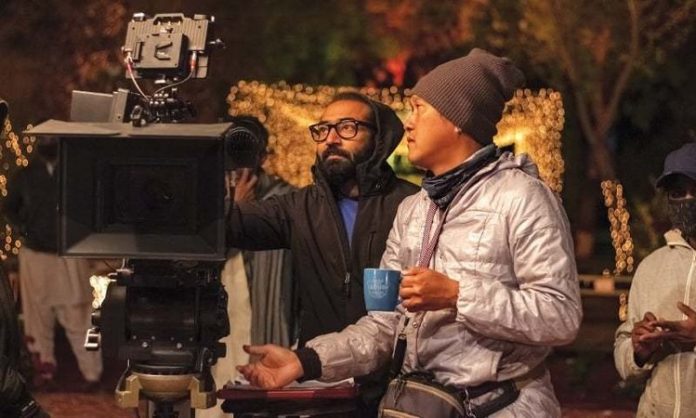“I’m working on the script of a new movie and plan to begin shooting by the end of this year,” director Nadeem Baig tells me. It’s a surprising revelation, considering cinemas, all over the world, are yet to open entirely.
Had it not been for the coronavirus pandemic coming along, Nadeem’s star-studded London Nahin Jaunga (LNJ) would have released this year. Instead, the movie remains in limbo, with 18 days’ worth of shooting in London still to be completed.
But even while local cinema has been flailing in the throes of a pandemic, TV viewership has skyrocketed. And in this realm, Nadeem has struck lucky, with the year starting off with his drama Meray Paas Tum Ho (MPTH) breaking all-time viewership records.
With this in mind, I had expected Nadeem to perhaps be working on a new drama serial. Instead, he’s occupied with wrapping up the script of an “action comedy”, being written by Vasay Chaudhry that may just end up releasing before the unfortunate LNJ.
The silver screen
With one movie stuck halfway and the temptation of making another hit drama ever present, Nadeem’s passion for filmmaking is still drawing him towards the silver screen. He reasons to me that cinemas will open by next year after all, and places his faith in the promised vaccine which, he hopes, will swoop into our lives and wipe away Covid-19.
“I hope that by summer next year, life would have normalised,” he says optimistically. “That’s when I will be ready to schedule a release date. As a director, one of my main priorities always is to maximise profits for my producer. Right now, even if cinemas do open up, I would not feel safe going to watch a movie. And if I’m not comfortable sitting in a movie theatre, I can’t expect my audience to want to do the same.”
This new movie, tentatively titled Naram Garam, will be starring Vasay Chaudhry and — no big revelation here — Humayun Saeed. “Vasay will surprise you in this movie,” Nadeem predicts. “He is the main lead, although Humayun will also be playing a very significant part.”
Choosing the right actors

Humayun Saeed and Nadeem, of course, form a powerful duo, with Nadeem directing major projects that are produced by Humayun’s Six Sigma Productions. Still — I ask Nadeem a question he must be asked very often — why does Humayun have to be part of every one of his projects?
He has answered the question frequently enough to reply easily, “If not Humayun, who else? I think he is the best actor that we have. He keeps proving his mettle with more roles, like in Meray Paas Tum Ho this year.”
There are other actors, I muse, such as Fahad Mustafa.
“And I have worked with Fahad,” points out Nadeem. “Fahad really shone in Jawani Phir Nahin Ani 2 [JPNA2]. He had been working with our team for the first time and I was worried that he may have concerns that Humayun would be playing a more significant role, since he was co-producer as well as one of the actors. When he saw the final movie, Fahad really liked it.
“I similarly told Adnan Siddiqui to place his trust in me in the case of Meray Paas Tum Ho. I would never allow a story to get undermined and my focus is on every character, as much as required. Humayun wouldn’t want that either. He has a big heart and besides, as producer, he wants the overall project to do well.”
We move on to another actor who is a frequent part of Nadeem’s projects: Mehwish Hayat.
“I love working with Mehwish because I can really make her push her boundaries,” he says. “She manages to pleasantly surprise me each and every time.”
“I would also love to work with Mahira Khan someday,” continues Nadeem. “I feel that her talent is underutilised and she needs to take on roles that give her a greater margin to perform.”
Notwithstanding the absence of Mahira Khan, Nadeem’s repertoire stands out with projects featuring almost all of Pakistan’s top tier actors. His directorial prowess is undeniable, most recently evident in MPTH, which was, in essence, a story that had been told in many dramas before.
The directorial eye
Nadeem mostly remains in the shadows, not usually stepping into the spotlight to give long interviews or post long testimonials on social media. Why?
“I enjoy the limelight, but only to a certain extent,” he accepts. “For me, there could be no better acknowledgement of my work than when crowds thronged Humayun, an actor that they had been seeing on TV for more than two decades, and chose to call him ‘Danish’. Or when Ayeza Khan became ‘Mehwish’ and Adnan Siddiqui ‘Shahwar’. I enjoyed seeing all that, experiencing it.”
This relative anonymity that he has chosen for himself allows Nadeem to nonchalantly step into a cinema and watch his movie with his audience.
“I love to see how the audience reacts to a certain dialogue or scene,” says Nadeem. “I believe that, while a solid script is imperative, a film is ultimately based on the director’s vision. The director can make a mediocre script become exceptional, or create a bad movie from a very good script. There have been times when the audience has reacted beyond my expectations, and it has made me feel incredibly happy.”
Recalling some such moments, he continues, “Audiences loved Jawani Phir Nahin Ani [JPNA] and then, they were riveted by Punjab Nahin Jaungi [PNJ]. I saw PNJ in a cinema in Karachi and then, later, at the New York Film Festival, and both times the audience’s reaction was the same.”
“They loved the storyline, mixing romance with drama, music and light spurts of humour. It’s actually strange that when I was making PNJ, I wasn’t sure about it at all. It was only when I added the musical score and saw the movie again that I called Humayun up and told him that it had promise, that it felt like an indigenous Pakistani story.”
The fear of failure
Nadeem is particularly smitten with stories that are true to Pakistan. “It’s important to stick to our own way of storytelling,” he says, eschewing the inclination to create Bollywood-esque productions. “Script sense is very important but, above all, a filmmaker must never assume that his or her audience is stupid. Every nuance and tiny twist gets noticed. And the Pakistani audience is very generous — when they like a film, they appreciate it wholeheartedly.”
The Pakistani audience can also be brutal, walking out of a movie they don’t like and emptying out cinema theatres within two days of a movie’s release. “Yes, and it’s heartbreaking when I go to see a local movie and the audience walks out,” he says.
His own movies have never suffered such rejection but, as a filmmaker, does he ever worry that he may have to endure a similar experience one day?
“Yes, it scares me. On the day of the premiere, I’m actually relieved if people come out and aren’t cursing me! At the same time, I’m confident that if my film is bad, I deserve people walking out from it. I had better make a good movie that is worth their money and their time.”
He continues, “I think that so many movies could do better if filmmakers sought advice from each other. I’m very open to criticism but, for many people, it boils down to a play of egos. They feel insulted if one of their peers gives them honest feedback. And they are unwilling to support each other.”
Scripts and storylines
Long before he was swept away in a whirl of cinema blockbusters, Nadeem was fully immersed in the TV industry. An impressive list of TV dramas can be credited to him, including Geo Entertainment’s hit Dolly Ki Aayegi Baraat series, which he co-directed with Marina Khan.
“I have a passion for comedy but I realised that it is a genre that gets treated unfairly. Dolly… is probably Geo’s highest-rated drama and, at the Lux Style Awards, the actors who worked in the drama as well as the scriptwriter, Vasay Chaudhry, got nominated. But everyone assumed that the director doesn’t have much to do in a comedy. In fact, it is the most difficult genre to tackle. Timing and dialogue delivery has to be planned out for maximum impact.
“I realised back then that I needed to dabble with serious storylines. The next drama that I directed was Munn Jali, with a heavy duty emotional plot. I got nominated for it at the LSAs.”

We fast forward to the present, when two of his more serious projects, LNJ and MPTH, have been scripted by Khalil-ur-Rehman Qamar. Khalil may have long been recognised for his craft but, lately, he has been making waves for all the wrong reasons, reveling in making offensive, crass and misogynistic statements, often times directly hurled at the women around him.
Some of these statements were made while MPTH was at the zenith of its popularity. It led to many commentators citing MPTH as an anti-feminist drama. Did this worry him?
“I was worried because Meray Pass Tum Ho was merely narrating a story. Khalil sahib’s comments placed it in a negative light, and made people talk against it.”
And yet, does he plan to continue working with the writer? “I admire his writing skills and his way of storytelling. His personal views don’t matter to me,” says Nadeem.
“I think I’m one of the very few people who can argue with Khalil sahib and convince him to change certain parts of the script. After working with him on a number of projects, now he sometimes actually listens to me, and is open to my suggestions. From a personal perspective, the script is extremely important to me and I’m not satisfied until it makes complete sense to me.”
Nadeem is also looking into directing a web-series. Does he plan to dabble with slightly more ‘adventurous’ content, given that censorship is not strict in the digital sphere? “Only if required. If a story doesn’t need to be sensationalistic, then there’s no need to divert the audience away from the main plot.”
We move on to discussing Asim Abbasi’s Churails, the first original Pakistani web-series to be shown on the online streaming platform Zee5.
“Honestly, I didn’t like the climax. It didn’t need to be so brutal. Also, the cursing, alcohol, drug abuse and sleeping around wasn’t really needed in the series. Had it been an action movie, perhaps it would have fit in but, here, it just took away from the main narrative. It’s like adding four item songs in a serious movie. The message itself loses its clarity and the audience ends up remembering only the item songs.”
Does he have plans on how he wants to go about making his first web-series? Could it possibly be a period drama Ertugrul, a project that Humayun Saeed has hinted that he may be looking into?
“I’m planning on working on a romantic, light-hearted story, with an important social issue embedded within it. As for the historic period play, we did make some plans but, honestly, it would require extensive finances. Until we have a certain budget at our disposal, which I feel can only be provided by the government, we can’t really make a production that won’t be substandard.”
There’s one thing for sure; whatever Nadeem works on next, it’s going to be a genre that he understands well. And it doesn’t hurt that he’s good at it too.








